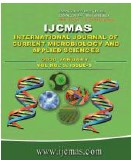


 National Academy of Agricultural Sciences (NAAS)
National Academy of Agricultural Sciences (NAAS)

|
PRINT ISSN : 2319-7692
Online ISSN : 2319-7706 Issues : 12 per year Publisher : Excellent Publishers Email : editorijcmas@gmail.com / submit@ijcmas.com Editor-in-chief: Dr.M.Prakash Index Copernicus ICV 2018: 95.39 NAAS RATING 2020: 5.38 |
Cotton (Gossypium spp.) is one of the important commercial crops grown for its natural fibre, which has its own place among many other natural and synthetic fibres. Among the commercial crops grown in India, cotton occupies a pride place of being the prime supplier of raw material (85%) for textile industry, which is one of the leading industries in the country. In India, cotton provides means of livelihood for about 60 million people through its cultivation, trade and industrial use. Exploitation of heterosis has lead to improvement in productivity of different crops including cotton. In cross pollinated crops like maize, the hybrid breeding programmes are supplemented by regular systematic improvement programmes aimed at improving combining ability of parents. This has made hybrid development more scientific and purposeful than that based on random crossing of available lines or varieties. Here an effort was made to predict the performance of 52 hybrids derived from two (RAHH 102 and RAHH 136) sets of F4 lines along with their parents (A, B, C and D) were subjected to diversity analysis using RAPD marker system. The actual field performances of the hybrids were correlated with the genetic diversity calculated with the RAPD molecular marker and found insignificant association. This concludes that higher end marker could be utilized for estimating the genetic diversity between Parents.
 |
 |
 |
 |
 |